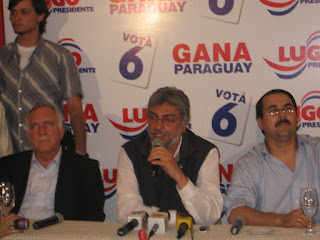“Chile” comes from the Aymara for “snow” and during the night, the metal benches provided little comfort, so I took to putting on nearly all the clothes I’d brought for my time in Asunción, including the typical Christine look of a skirt over my jeans. Apparently, this and the multiple layers of long-sleeves, while entirely practical in Chile and an unremarkable fashion choice in NYC, looked too muslim for the security people here in Miami as I tried to rush to flight that I was afraid I’d miss (this time entirely my fault as I chortled my way through http://sleepinginairports.com). The guard stopped me after I walked under the arc de triomphe of the sole operating security machine and consulted with his superiors. It took me a moment to realize the nature of his suspicion, which added to the risibility of a Kafkaesque 60hr escapade. After complimenting my style choice, I was waved through and hurried to my Newark-bound which (as of writing) is 90minutes delayed.
Incidentally, the trip down took 18 hours from NYC to Asunción, and that with layovers. And I have negotiated free beverages because the flight attendants think me an unusually patient and accommodating passenger, having switched seats a few times in order to accede to the wishes of other customers.
The culprit airlines? American and LAN.
And, for an “as-it-happened” account of the last few days, here are some text messages I sent:
“Am stuck in Santiago airport 4 24 more hrs bc of dumb error. Boo.” Sent: 4/28/08 at 4:04am
“Its worse than that. Prob worst flight situation of my life” Sent: 4/28/08 at 4:55am
“Am in miami at last! Now to immigration” Sent: 4/29/08 at 5:43am
“Stuck in Miami. Lan didn’t confirm am flight and so coming to ewr at 4pm if all goes well” Sent: 4/29/08 at 9:17am
“On plane. They thought my clothing was muslim suspicious and stopped me at security” Sent: 4/29/08 at 12:44pm
“Am on plane. We are delayed for 90min due to weather in nj” Sent: 4/29/08 at 1:24pm























